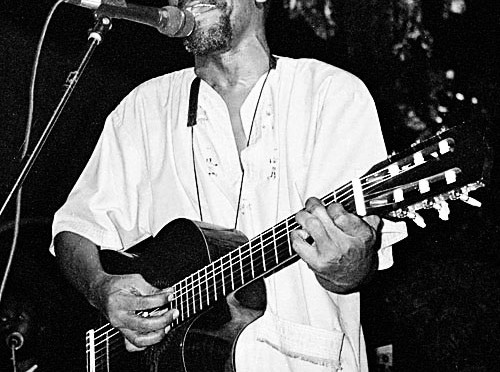Manno Charlemagne is one of Haiti’s greatest singers. His albums are all gems of Haitian culture rooted in informed political expression – in place – but open to the world; both wise and beautiful.
In 1957, Francois Duvalier became president of Haiti. In 1963, he proclaimed himself president for life. With his second presidency came an eventual complete control of Haitian space and life. This included music. No music could publicly go against his self-declared ‘revolution’. Duvalier’s complete control of Haitian space and life was not new. It was a Neo-colonial, not in the racial sense but in an administrative sense.
St-Domingue, colonial Haiti, was typically led by a military leader. He established political, social, and cultural ‘order’. That control led to the banning of some african dances and musical practices in order to establish order. Toussaint Louverture, not the liberator of Haiti but the person who established the first instance of national (a ‘black’ nation that wanted to end slavery) independence, without territorial independence, (I.E. Jean-Jacques Dessalines’s Haiti is a project that goes past black independence) also banned certain musical practices by banning the use of drums. Alexandre Petion, the first Haitian president, banned the African choir, a choir that is present in Vodou as the Hounsi choir. And so on and so forth.
Not only did Duvalier stop others from singing, but he also introduced his own propaganda through song.
“duvalier..
duvalier..
duvalier..
president a vie..”
(duvalier ..
duvalier ..
duvalier ..
president for life ..”)
“yon nonm konsa
chita chita l
na p enmedel ..
(a guy like that
is sitting comfortably
and u’re bothering him..”)
“mache pran yo duvalier
mache pran yo ..
(get them duvalier
get them ..”)
se le nwa se le nwa
tout tan ou la
neg new toujou o pouvwa ..
(“it’s the black the black
as long as you are here
black humans will always be in power ..”)
Starting with his first album Manno et Marco, Manno brought back sung political sentiment to Haitian space and to political life. He’s released 5 albums so far.
Manno Charlemagne began his career during Jean Claude Duvalier’s dictatorship, at great personal peril. Songs such as “Pouki”, written by internationally renown Haitian writer Lyonel Toruillot, ask burning political questions like why things are not separated 50 / 50 and that Haiti is a forest and has lions and tigers told and still tell of Haitian life.
Manno’s music is much more than just political. It’s beautiful. It’s easy to hear Manno’s aesthetic in Italian madrigals and in west African griot song, in terms of the depth of the artistic intent. His aesthetic is very close to the latin american Nueva Trova without being it. It is a product of the terroir all the while looking out to the world.
It’s important to note that Manno is not a Prometheus however, though he was the first of his era to sing political troubadour songs. Haitians, immigrating back to Haiti, brought back the guaracha from Cuba and founded the contemporary Haitian Troubadour tradition. He belongs to the tradition. But, he surely brought politics and intellect to a form of music that normally sang romances like no one else.
Manno Charlemagne, the political troubadour, has accomplished.


